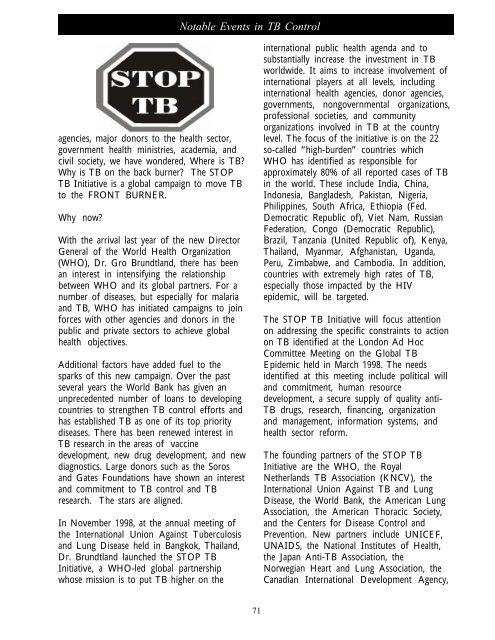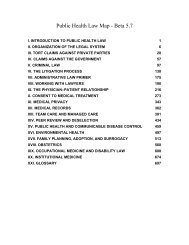CDC History of Tuberculosis Control - Medical and Public Health ...
CDC History of Tuberculosis Control - Medical and Public Health ...
CDC History of Tuberculosis Control - Medical and Public Health ...
You also want an ePaper? Increase the reach of your titles
YUMPU automatically turns print PDFs into web optimized ePapers that Google loves.
agencies, major donors to the health sector,<br />
government health ministries, academia, <strong>and</strong><br />
civil society, we have wondered, Where is TB?<br />
Why is TB on the back burner? The STOP<br />
TB Initiative is a global campaign to move TB<br />
to the FRONT BURNER.<br />
Why now?<br />
With the arrival last year <strong>of</strong> the new Director<br />
General <strong>of</strong> the World <strong>Health</strong> Organization<br />
(WHO), Dr. Gro Brundtl<strong>and</strong>, there has been<br />
an interest in intensifying the relationship<br />
between WHO <strong>and</strong> its global partners. For a<br />
number <strong>of</strong> diseases, but especially for malaria<br />
<strong>and</strong> TB, WHO has initiated campaigns to join<br />
forces with other agencies <strong>and</strong> donors in the<br />
public <strong>and</strong> private sectors to achieve global<br />
health objectives.<br />
Additional factors have added fuel to the<br />
sparks <strong>of</strong> this new campaign. Over the past<br />
several years the World Bank has given an<br />
unprecedented number <strong>of</strong> loans to developing<br />
countries to strengthen TB control efforts <strong>and</strong><br />
has established TB as one <strong>of</strong> its top priority<br />
diseases. There has been renewed interest in<br />
TB research in the areas <strong>of</strong> vaccine<br />
development, new drug development, <strong>and</strong> new<br />
diagnostics. Large donors such as the Soros<br />
<strong>and</strong> Gates Foundations have shown an interest<br />
<strong>and</strong> commitment to TB control <strong>and</strong> TB<br />
research. The stars are aligned.<br />
In November 1998, at the annual meeting <strong>of</strong><br />
the International Union Against <strong>Tuberculosis</strong><br />
<strong>and</strong> Lung Disease held in Bangkok, Thail<strong>and</strong>,<br />
Dr. Brundtl<strong>and</strong> launched the STOP TB<br />
Initiative, a WHO-led global partnership<br />
whose mission is to put TB higher on the<br />
Notable Events in TB <strong>Control</strong><br />
71<br />
international public health agenda <strong>and</strong> to<br />
substantially increase the investment in TB<br />
worldwide. It aims to increase involvement <strong>of</strong><br />
international players at all levels, including<br />
international health agencies, donor agencies,<br />
governments, nongovernmental organizations,<br />
pr<strong>of</strong>essional societies, <strong>and</strong> community<br />
organizations involved in TB at the country<br />
level. The focus <strong>of</strong> the initiative is on the 22<br />
so-called “high-burden” countries which<br />
WHO has identified as responsible for<br />
approximately 80% <strong>of</strong> all reported cases <strong>of</strong> TB<br />
in the world. These include India, China,<br />
Indonesia, Bangladesh, Pakistan, Nigeria,<br />
Philippines, South Africa, Ethiopia (Fed.<br />
Democratic Republic <strong>of</strong>), Viet Nam, Russian<br />
. Federation, Congo (Democratic Republic),<br />
Brazil, Tanzania (United Republic <strong>of</strong>), Kenya,<br />
Thail<strong>and</strong>, Myanmar, Afghanistan, Ug<strong>and</strong>a,<br />
Peru, Zimbabwe, <strong>and</strong> Cambodia. In addition,<br />
countries with extremely high rates <strong>of</strong> TB,<br />
especially those impacted by the HIV<br />
epidemic, will be targeted.<br />
The STOP TB Initiative will focus attention<br />
on addressing the specific constraints to action<br />
on TB identified at the London Ad Hoc<br />
Committee Meeting on the Global TB<br />
Epidemic held in March 1998. The needs<br />
identified at this meeting include political will<br />
<strong>and</strong> commitment, human resource<br />
development, a secure supply <strong>of</strong> quality anti-<br />
TB drugs, research, financing, organization<br />
<strong>and</strong> management, information systems, <strong>and</strong><br />
health sector reform.<br />
The founding partners <strong>of</strong> the STOP TB<br />
Initiative are the WHO, the Royal<br />
Netherl<strong>and</strong>s TB Association (KNCV), the<br />
International Union Against TB <strong>and</strong> Lung<br />
Disease, the World Bank, the American Lung<br />
Association, the American Thoracic Society,<br />
<strong>and</strong> the Centers for Disease <strong>Control</strong> <strong>and</strong><br />
Prevention. New partners include UNICEF,<br />
UNAIDS, the National Institutes <strong>of</strong> <strong>Health</strong>,<br />
the Japan Anti-TB Association, the<br />
Norwegian Heart <strong>and</strong> Lung Association, the<br />
Canadian International Development Agency,
















